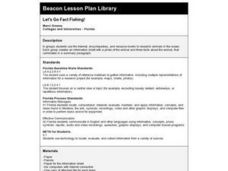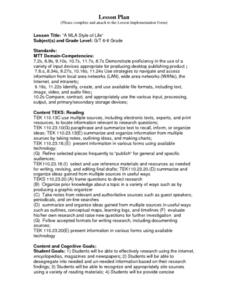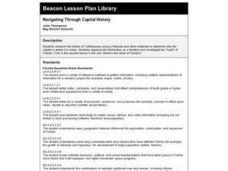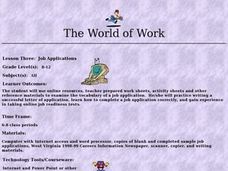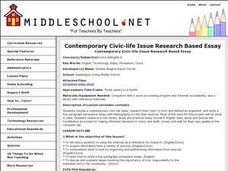Curated OER
You Smoke You Croak
Sixth graders investigate the effects of tobacco. In this personal health activity, 6th graders use print and Internet sources to research the effects of smoking. Students create PowerPoint presentations using their research findings.
Curated OER
Pequeno Estudio Geografico
There is rich symbolism behind a country's flag. Have your Spanish speakers research a country's flag and inquire about its symbolism. Then, to prepare for their presentation, each learner could find a way to visually represent their...
Curated OER
Exploring Suffragists
Students engage in a conversation with the class about suffrage- the right to vote. They choose one specific suffragist and use the Internet and other reference materials to learn more about this person. They prepare a presentation to...
Curated OER
The Couplet
Young scholars create the sounds of a thunderstorm with a symphony of body percussion to compose a couplet about rain using Microsoft word to publish. They are introduced to rhyming dictionaries and thesauruses and use Internet sources...
Curated OER
North American Explorers
Sixth graders discuss famous explorere then research an explorer, collect reference materials and take notes using notecards. They write a three to four page typed and double spaced report then present their findings to the class.
Curated OER
Voyage to the New World
Young scholars take notes as they listen to a segment from Discoverers of the New World, the Darkness of the Sea. In this Christopher Columbus lesson, students write questions based on the material read and then research the answers.
Curated OER
Native California Americans
Fourth graders study the differences in the ways of life of five different Native California Tribes. They assess the use of technology, computers and the Internet as valuable investigation tools.
Curated OER
Let's Go Fact Fishing!
Students work in pairs to research animals in the ocean. They use the Internet, encyclopedias, and resource books to complete an information sheet with a photo of the animal and three facts. They present their mini-reports to the class.
Curated OER
What is a National Forest
Young scholars select and research a National Forest near their local community. They read and discuss the pamphlet "A Guide To Your National Forests," view photos of national forests, conduct Internet research, and complete the student...
Curated OER
The ABC's of DNA
Students describe genetics as if they were explaining it to a young child. After reading an article, they discover new discoveries in the human genome project. Using the internet, they research a pair of genetic terms and develop a...
Curated OER
"A MLA Style of Life"
Learners effectively research using the internet, encylopedias, magazines and newspapers. They desegregate into needed and un-needed information based on their research findings. Pupils recognize and appropriately site sources using a...
Curated OER
Plant Pollination
Students investigate methods of pollination for various flowers. In this plant biology lesson plan, students learn the parts of a flower and form a hypothesis about the method of pollination for the flower. They determine the validity of...
Curated OER
Navigating Through Capital History
Fourth graders research the history of Tallahassee using a Website and other materials to determine why the capital is where it is today. They organize the information on a timeline and investigate the "heart" of Florida.
Curated OER
DNA-B-C's
Young scholars review what they already know about DNA. After reading an article, they discover a new technique to map the course of evolution. In groups, they create ways to present this material to younger children and research DNA's...
Curated OER
Greek Gods Who Are They?
Sixth graders research a Greek God with a partner and prepare a presentation for the class. They use the computer and Internet, as a motivator for a Social Studies unit and explore the mythology, legends, values and beliefs of a people.
Curated OER
The Great Atomic Debate
In this atomic theory worksheet, students write a skit given a story line using Aristotle, Democritus and Dalton. They are given internet sites to find information about the facts and ideas of these past contributors to science.
Curated OER
Ancient Egypt
Pupils use the internet to gather information on Ancient Egypt. Using this information, they create their own name cartouche using markers and construction paper. They also make pyramid cutouts and draw pictures of the Great Sphinx.
Curated OER
Disease Research Project
Ninth graders explore the human body and how disease affects man. After using the internet and other reference materials to complete research, 9th graders write a paper on the cause and effect of a selected disease. In preparation for...
Utah Education Network (UEN)
8th Grade Poetry: Narrative Poem
The first lesson of a five-lesson unit designed for eighth graders has class members reading and watching a video of Edgar Allen Poe's narrative poem, "The Raven." They then craft their narrative poem, illustrate it, and share their work...
The Alamo
The Alamo
Remember the Alamo! Scholars investigate the Battle of San Jacinto during the Texas Revolution. Using models, maps, quotes, biographies, and the Oath of Allegiance, the Alamo comes to life as the stories of those who fought and died in...
Curated OER
The Last Word: Using Critical Thinking and Analysis to Reach a Decision
Want to explore the process of writing a persuasive essay and tie it in with the upcoming elections? Class members use Venn diagrams and the hamburger model of persuasive writing to write a five-paragraph essay on elections and...
Curated OER
The World of Work: Job Applications
Students use online resources and activities to examine the vocabulary of a job application. In this job application activity, students review and take sample online job readiness exams. Students read a publication about completing a job...
Curated OER
Contemporary Civic-life Issue Research Based Essay
Seventh graders write a five paragraph persuasive essay on a contemporary civic-life issue.
Curated OER
"I" Witness to History
Young journalists write diary entries from the point of view of a person involved in a historical event. They focus on including facts, clear narration, and accurate description of the individual's feelings.









